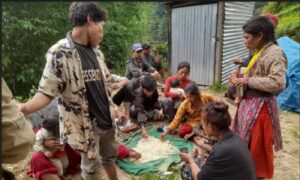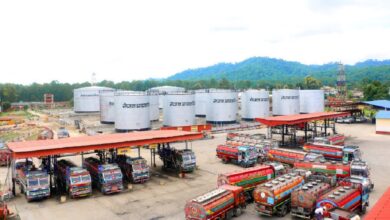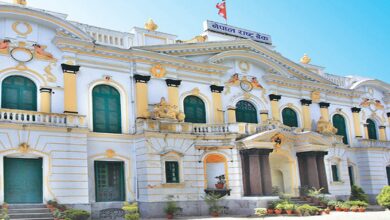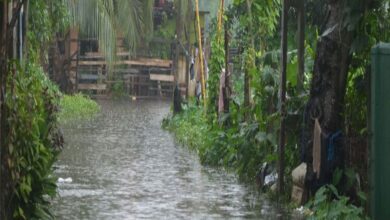Dashain under tarps: Ongoing struggle of Daduwa landslide survivors
As the vibrant festival of Dashain approaches, with excitement spreading through the villages of Nepal, the air in Daduwa, a small settlement in Dolakha district, is sombre. The celebration feels distant for the victims of the landslides that struck the area just a month ago, forcing families into makeshift shelters under tarpaulins.
Sita Thami, a resident of Daduwa in ward 1 of Doramba-Sailung Rural Municipality, sits quietly in the small camp she now calls home. It’s been over a month since her home was rendered uninhabitable by a massive landslide on August 24. She describes how her infant son has been suffering from the cold, coughing frequently in the damp and harsh conditions. “Everyone else is celebrating Dashain, but our Dashain is under a tarpaulin,” she says, her voice soft but full of resolve. “Even though we have nothing, we will celebrate for the sake of the children, with the relief food we’ve received.”
The landslide that devastated the Daduwa area displaced 43 families, including Sita’s. Out of them, 18 families have managed to return to their homes after clearing mud and making temporary repairs, but 25 families remain in roadside tents and tarpaulin shelters. “We’ve been clearing the debris and making the roads passable so that at least vehicles can come through during the festival. No help came, so we—the victims—worked together to restore the roads,” Sita explains.
For these families, Dashain celebrations are starkly different. They are using their limited resources to create some semblance of normalcy amidst the destruction. While most villagers will adorn new clothes and partake in feasts, the victims of Daduwa are huddling together, sharing what little they have. “We plan to celebrate communally, under the tarpaulins. We have even made plans to construct a temporary communal shelter from the corrugated sheets we received in relief aid,” Sita adds.
In this remote, underdeveloped village, 25 families belonging to the minority Thami community are spending their days and nights under tarpaulins, struggling to stay warm and safe. Manju Thami, a mother who recently gave birth, is also preparing to observe the festival in the same dire conditions. “We’ve got nothing but this cold ground under the tarpaulin. Poverty and hardship have followed us, but somehow, we’ll make it through the festival,” she says. The relief aid has provided them with basic necessities like rice, salt, and oil, but the joy of the festival is dimmed by the circumstances.
The situation has worsened as the landslide washed away their crops, further deepening the crisis for many families. “We used to survive on daily labour,” says Manju. “Now, with our homes destroyed and fields ravaged, we’ll scrape together what little we have to celebrate Dashain.”
Local ward member Mangale Thami has also been affected by the landslide, living in a makeshift shelter under a tarpaulin like many others. He describes how the villagers worked together to clear the roads, making it possible to travel between their village and the district headquarters of Manthali. “Relief organisations and local authorities have provided some assistance to the displaced families,” he says. “But it’s the cold, especially at night, that is making many children ill.”
Despite the hardships, Mangale is determined to keep up the festival spirit. “Even though we’re displaced, we’ll welcome our friends and family under these tarpaulins. This year, we’ll receive Dashain blessings in a tent,” he says. The community’s strength lies in its unity, as they plan to celebrate Dashain together, even if it’s with heavy hearts and under makeshift roofs. While the rest of Nepal celebrates with joy and grandeur, the landslide victims of Daduwa will experience a much more subdued festival—one where resilience takes centre stage over revelry.
The stark contrast between the vibrant celebrations elsewhere and the muted, communal Dashain under tarpaulins in Daduwa is a reminder of how disaster can strip away even the smallest pleasures. But for the families here, there is hope in solidarity, as they look forward to better days and perhaps a brighter Tihar in newly built shelters.





